Doctor Who’s Best Episodes: the Russell T Davies Era
With Russell T Davies back steering the TARDIS, we celebrate the finest stories of his 2005-2010 showrunner reign, feat. Christopher Eccleston and David Tennant as the Doctor.
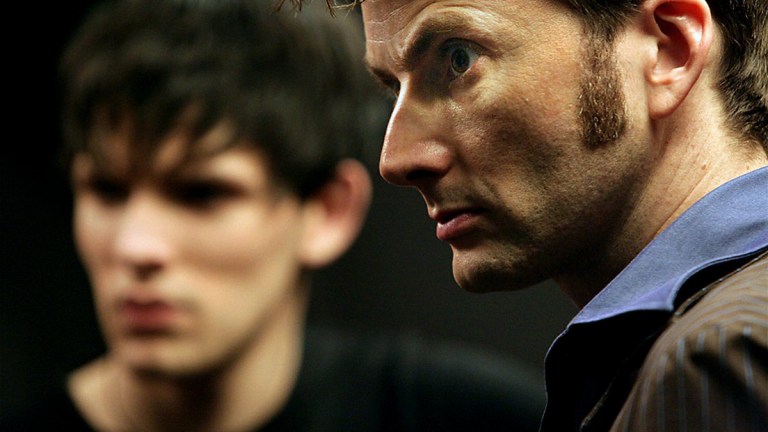
Warning: contains spoilers for all episodes listed.
The wonderful thing about ranking articles is that they’re a safe space where everyone feels confident and happy in sharing their favourites without fear of unexamined bilious ejaculations, in the understanding that everyone’s tastes are different, and it’s only Doctor Who for God’s sake. It’s not like someone dies if we don’t like ‘Inferno’.
Similarly, fandom responded to Russell T. Davies’ innovations and expansions to Doctor Who with calm and measured articulations of their likes and dislikes, and no shrill hyperbole written in blinkered rage and 2am on Outpost Gallifrey. This author definitely didn’t.
It wasn’t always going to be this way. Most pitches and attempts at continuing Doctor Who after its 1989 cancellation were aiming for a cult BBC Two or post-watershed BBC One audience because it was considered Science-Fiction first and a family show second, and that’s where Science-Fiction ended up in those days. Attempts like ‘Death Comes to Time’, ‘Scream of the Shalka’ and frankly ‘The TV Movie’ were, irrespective of quality, not opening the doors wide.
Still, like the show, people grow.
Russell T Davies expanded what Doctor Who could be by returning the story to Rose’s family and flat in a London tower block (locations and characters the series had only touched on briefly before) and casting a working-class actor in plain, un-eccentric clothes without a Received Pronunciation accent. In doing so, he expanded the audience, by showing that Doctor Who didn’t have to be the version people (including Christopher Eccleston) remembered, and could be a show they saw themselves in. If his novelisation of ‘Rose’ is anything to go by, we can expect him to be similarly expansive in future episodes.
For all the bursts of joy and ebullience the revived show gave off, Davies’ work has a cynical undercurrent borne out by the – at best – bittersweet fates of the companions he created. Rose is torn apart from the Doctor and after traversing dimensions to be reunited with him, is given a genocidal clone version of him and told she can heal him like she did the original. Martha spends a series learning that the Doctor is still in love with Rose and she needs to get out of the TARDIS, ultimately ending up with Rose’s ex Mickey (and still we’re not entirely sure why) as a sort of consolation prize for both of them. Donna saves the universe and grows as a person, only to have those memories removed against her wishes in order to save her life. The trip of a lifetime, the trailer said, but apparently always with a cost.
Let’s revisit the high points of Davies’ first Doctor Who era.
10. Love & Monsters (Series 2, Episode 10, 2006)
Written by Russell T. Davies. Directed by Dan Zeff.
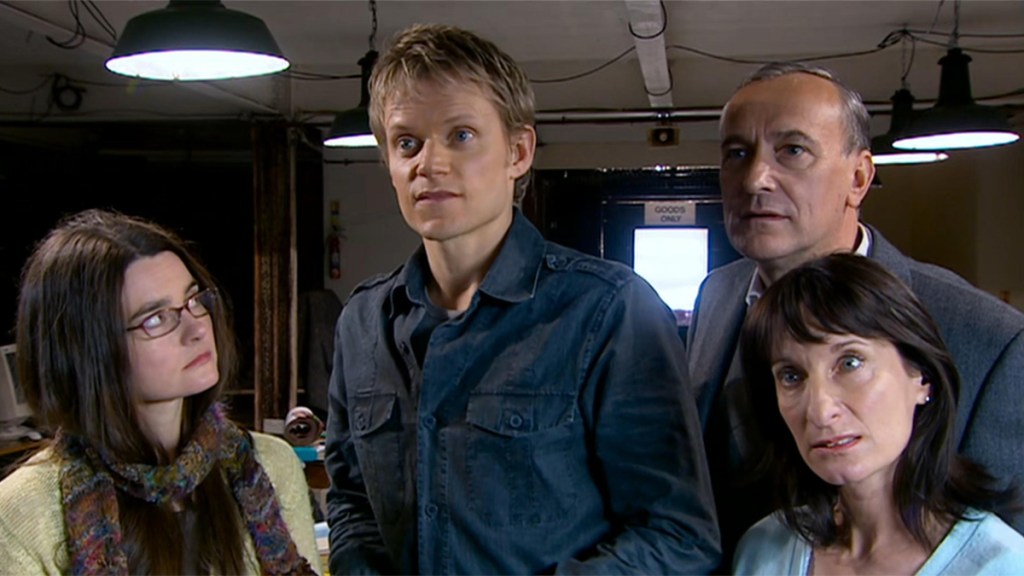
Of course, no one actually likes this story and we’re just putting it here to generate controversy and get those sweet sweet hate-clicks (especially when people see we’ve not included ‘Blink’).
Okay, now all the people who don’t understand subjectivity are off to complain, let’s talk about why this story is actually good.
Faced with a ‘Doctor-lite story, as they came to be known, Davies expanded on the ideas behind the character of Clive in his first Doctor Who script, ‘Rose’. Clive was a husband, a father, and a guy who tracked the Doctor somewhat obsessively before their worlds collided and Clive was horribly killed in front of his family. Clive represented the show’s fandom, so having him killed could be seen as a mean gesture, but this moment ultimately becomes the shorthand for next five years: the Doctor is wonderful, yes, but he’s also incredibly dangerous. Your story intersecting with his, even in the tiniest way, could be fatal. It’s like a Total Perspective Vortex, but with pathos.
In this episode we have Elton Pope (Marc Warren) and LI’n’DA – a group of people who are interested in the Doctor but who end up being friends due to their shared interest, another positive representation of fandom to add to Clive being a loving husband and father. They’re creative and supportive to one another. It’s only when someone comes in and imposes their will as an objective fact that the fun stops.
Davies clearly relishes clashing tones and jarring juxtapositions, and so we get – through the unreliable narrator that is Elton – Scooby Doo-style monster chases alongside a child losing his mother, cathartic joy and rushes of love, and the impact of Jackie Tyler’s loss. The inferred blow job gag, intended by Davies as a way of looking at disabled peoples’ desires and bigotedly revulsed responses to the subject, overshadows the ending and its incredible bleakness: the Doctor (especially the Tenth Doctor) is a mercurial figure whose presence points towards mortality and loss. This episode is the most eloquent expression of this idea: the Doctor’s life looks like nonsense from the outside (as Tom Baker reportedly once put it: ‘I’d fly around space solving f***ing crimes. Christ knows why and on whose behalf’), but when you get into it, then it’s just full of people grieving. Far from being embarrassing, the tonal variety of this episode is what makes it so strong.
9. Fires of Pompeii (Series 4, Episode 2, 2008)
Written by James Moran. Directed by Colin Teague.
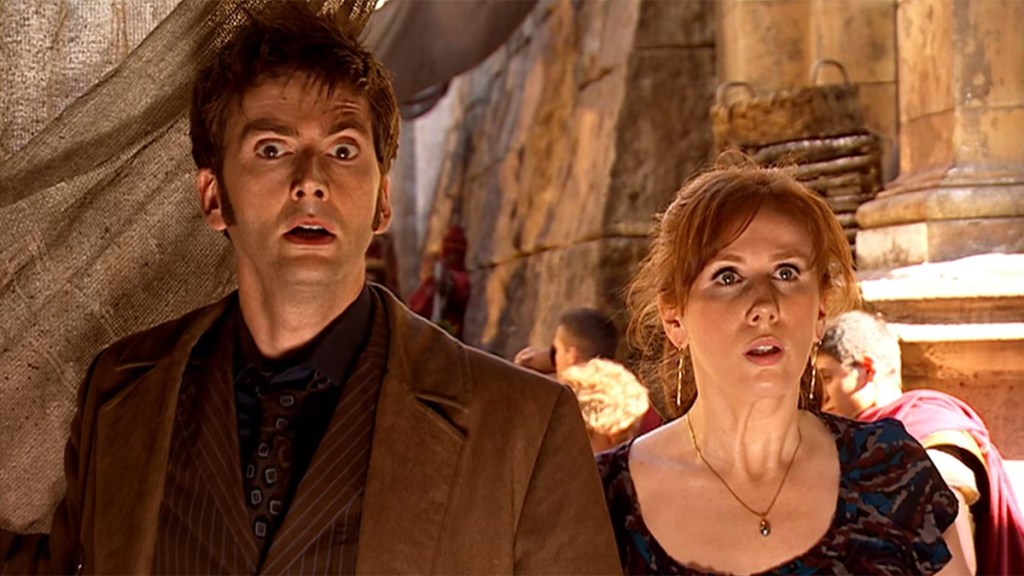
A story that manages to contain a fun romp, mass slaughter, copious fanwank and a properly cathartic ending.
Since ‘The Aztecs’ in 1964, and the Doctor’s assertion that you can’t rewrite history (which turned out to be either a lie or ignorance) there’s been a storytelling device in Doctor Who that certain events are fixed and can’t be altered. These tend to be events that involve atrocities, disasters or loss of life. They’re never just ‘On Tuesday the 8th of July 2022 some guy tried to defend himself against accusations that he’d farted in a lift by explaining that he’d rescued some missing episodes of a classic sci-fi show’, fixed points always seem very emotive, high-stakes incidents. This stems from the show’s original remit including historical stories where the idea was to educate, rather than diverge from historical truths.
While this type of story evolved into a pseudo-historical adventure, often including aliens and monsters to sit alongside a version of history, writers maintained this idea that the Doctor couldn’t rewrite atrocities due to the laws of his people. There are a few stories that examine what would happen if he did (most notably ‘The Waters of Mars’, but Simon Guerrier’s First Doctor novel ‘The Time Travellers’ is worth a look too) and conclude that the Doctor can rewrite time, but at a cost.
James Moran’s ‘The Fires of Pompeii’ attempts a middle ground between non-interference and changing history, with Donna Noble persuading the Doctor to save some people while keeping the timelines intact (turning the eruption of Vesuvius into a Trolley Problem where the Doctor has to make a choice between killing some people and letting more die). In this instance the writer decided that having the Doctor save everyone in Pompeii would have been “insulting to the real people who died.”
Moran’s script marries the pseudo-historical romp of ‘The Shakespeare Code’ (complete with Cambridge Latin Course jokes) to this moral dilemma. Along the way there’s a soothsay-off (which is incredibly thrilling for what is essentially just two people dramatically reading the Doctor’s biography on Wikipedia), some good monsters, and the Doctor brandishing a water pistol to scientifically implausible but hilarious effect.
Mostly, though, there’s Donna.
If there was any doubt that Catherine Tate was going to be incredible in Doctor Who,they’re utterly dispelled here. If we talk about companions as audience identification figures then Donna pleading with the Doctor to ‘just save someone’ feels like a key moment where the audience are either on her side or discomfited by the programme’s usual stance. Tate, not for the last time in Series 4, delivers a convincing portrayal of Donna being desperate and scared, and in doing so makes the final heroic moments feel earned.
8. Midnight (Series 4, Episode 10, 2008)
Written by Russell T. Davies. Directed by Alice Troughton.
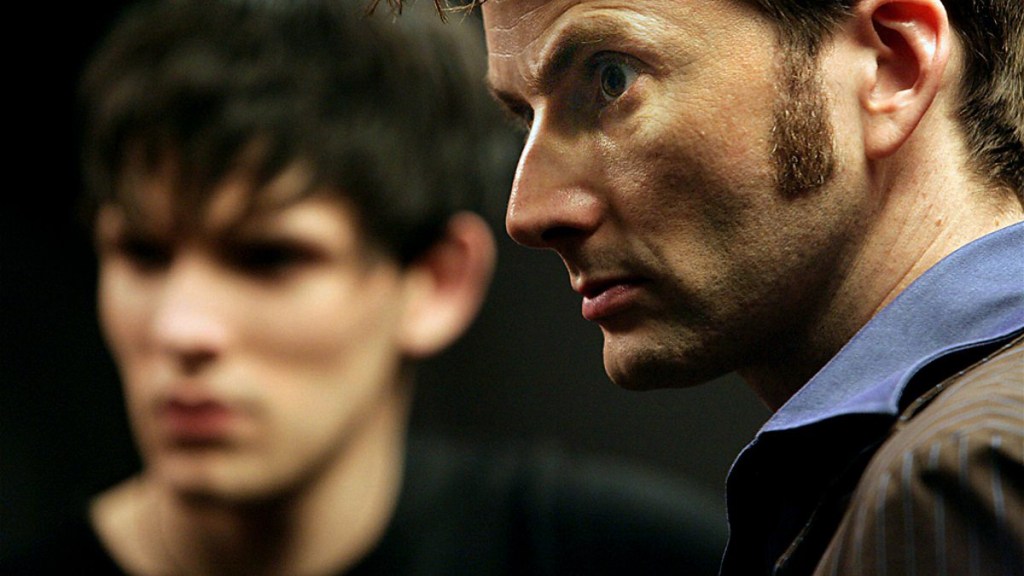
Russell T. Davies’ run was ostensibly optimistic, with all its talk of humanity surviving until the end of time and expanding into space, about the value of life and the heroism of everyday people. However, it had a cynical undercurrent exemplified by humanity, terrified and alone, ultimately cannibalising themselves before returning to the 21st century to terrorise their ancestors. The way the Doctor was contrasted with everyday life as someone who dabbled in it, with takeaway chips and pop culture references, but was held up above the ordinary, wasn’t straightforwardly good or bad. ‘Midnight’ is the release of Davies’ cynicism about the world into an episode of Doctor Who. The Tenth Doctor, for all his talk, isn’t able to save the day when a bus of tourists encounter something uncanny.
If ‘Heaven Sent’ is Peter Capaldi’s tour de force, this is Tennant’s. No other Doctor would be as effective here (although the Second Doctor would be interesting) because of the Tenth Doctor’s motormouth charisma. Having that removed as a weapon, and indeed weaponised against him, makes for an unnerving experience. Davies’ Doctor Who thought a lot about which games would be played in school playgrounds, and this is like a twisted children’s game as the Doctor’s voice is copied before being stolen, and the rest of the passengers give in to paranoia and fear that gives the lie to their initial good-natured chatter – the sort you’d expect from a RTD-era story.
It isn’t simply that the idea is clever, though, it’s that it’s realised so well. Everyone is happy to play the ugliness of their characters without going overboard, and Tennant really delivers when restricted from his usual mannerisms. He and Lesley Sharp sell the potentially silly mimicry scenes incredibly well, and so we have – near the end of Tennant and Davies’ first run on the show – another story in the ‘Love & Monsters’ mould that acknowledges that Doctor Who is a dream, some version of life where there are cathartic victories after struggle, and real life is in fact a messy and scary place where terror is inexplicable.
7. Smith and Jones (Series 3, Episode 1, 2007)
Written by Russell T. Davies. Directed by Charles Palmer.
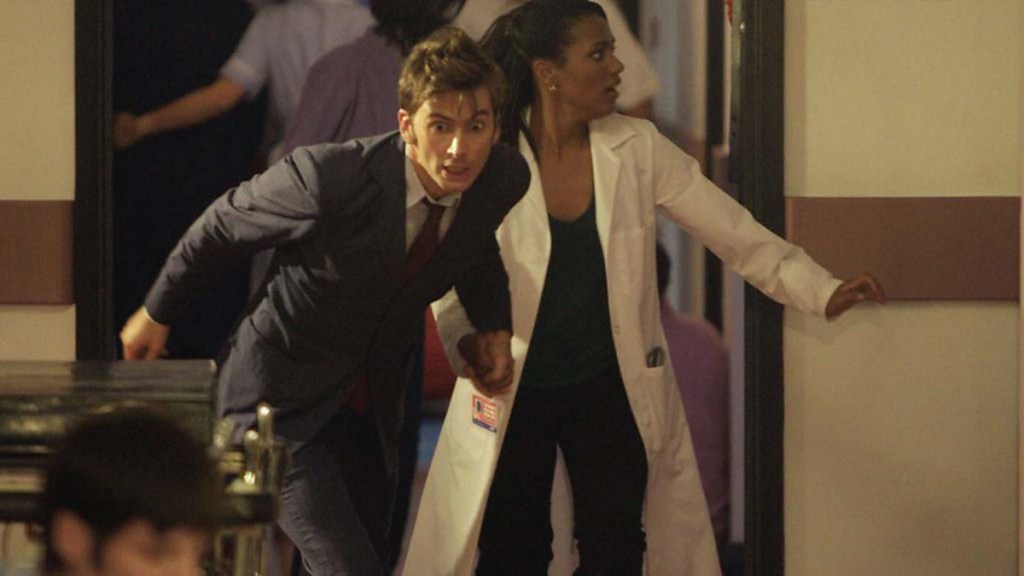
David Tennant was, after trying different things out in Series 2 , superb in his second series as the Doctor. In ‘Smith and Jones’ he seems so comfortable in the role. He’s largely restrained and performs anything zany as if it were a throwaway gag. Like Peters Davison and Capaldi, Tennant he has a really good thinking face and does a great deal with reaction shots. It’s satisfying to see the cogs turning behind whatever front the character is putting on. Watching him in this is just joyous.
Likewise, Russell T. Davies introduces Martha and her family in this story and by its end you know what their relationships are like and have a good idea what each individual is like too. You could criticise the episode for being very broad but considering that it introduces six new characters in a subplot of a season opener, it’s impressive that this much information has been conveyed. Martha herself isn’t fully formed yet, but the way she takes charge and makes good guesses show her potential.
Meanwhile we get, in the space of one episode: Anne Reid being a vampire who uses a straw (with a hilariously camp death scream), the Zovirax monsters (or ‘Slabs’ if you prefer), a hospital on the moon, and the introduction of the Judoon as a more bureaucratic, 12-rated Judge Dredd species who look like rhinos and combine squeaky marker pens with horrific laser-deaths. There is a lot happening and it breezes by, everything gets tidied away, and with that Doctor Who was back for its third series. Making all this seem effortless is a staggering achievement.
6. Gridlock (Series 3, Episode 3, 2007)
Written by Russell T. Davies. Directed by Richard Clark.
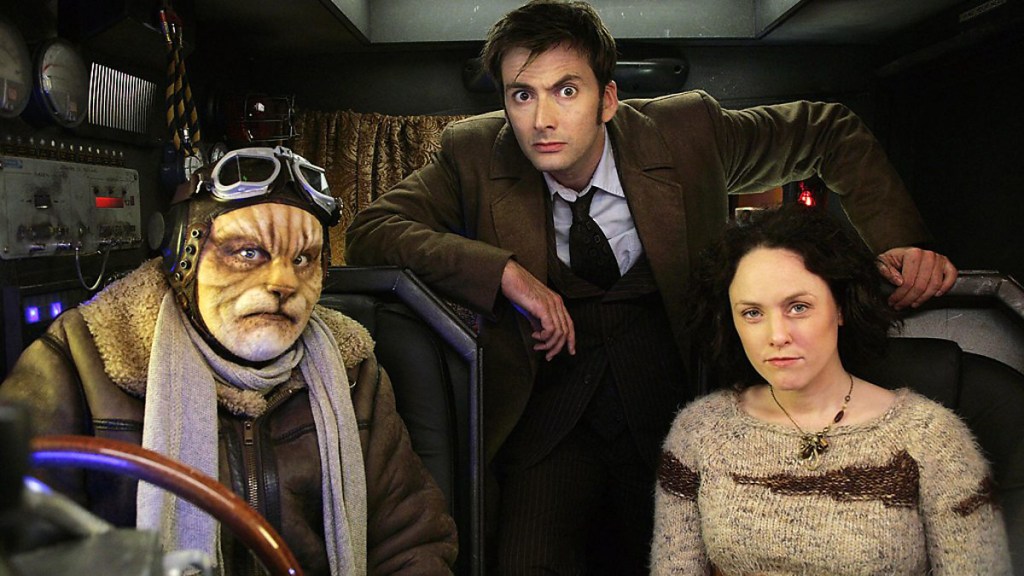
‘Gridlock’ is where Series 3’s themes of faith and its limitations start to solidify, but in case anyone thought that was too weighty it does it all around a 2000 AD/McCoy era-style romp about a traffic jam. Also Ardal O’Hanlon plays a big Irish cat whose children seem to take after him.
Sometimes the stories that do heavy lifting for a series arc are compromised by it (‘Into the Dalek’, for example) but this has enough going on to avoid that pitfall. The Doctor finally telling Martha about Gallifrey is a character moment rather than an exposition dump, and also a bittersweet one given Davies knew he was bringing back the Master and would ultimately bring back Gallifrey as a Hell-red nightmare. This is the Doctor remembering an idealised version rather than the reality, just as Martha would tell people the myth of the Doctor at the series’ end before telling him she had to leave for him for her own good. It’s an ambiguous look at faith, highlighting the power it has for people in times of need but also (come the series’ end) addressing blind faith as limiting. And it has giant crabs.
5. Dalek (Series 1, Episode 6, 2005)
Written by Rob Shearman. Directed by Joe Ahearne.
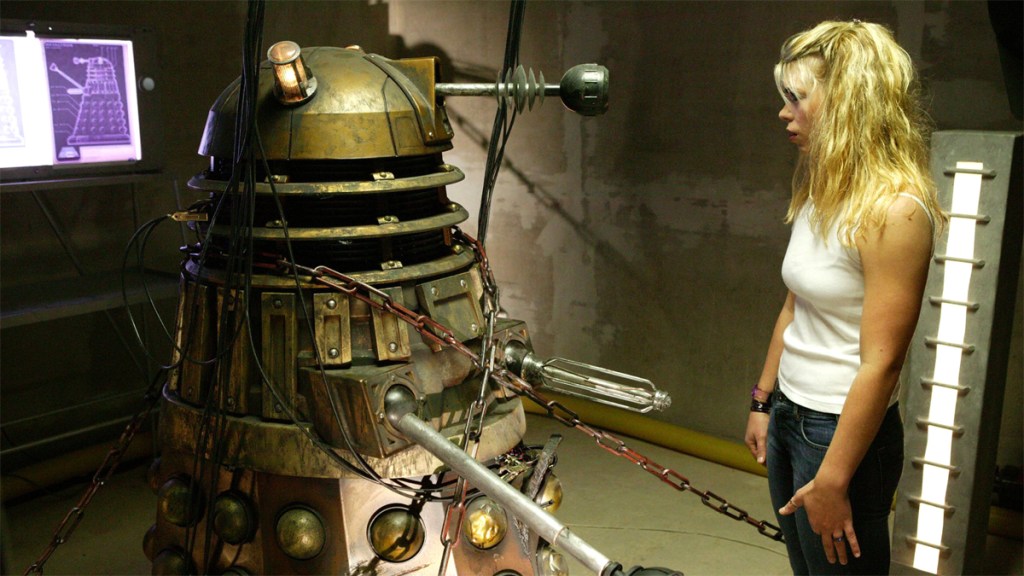
Adapted from writer Rob Shearman’s Big Finish story ‘Jubilee’, this was the reintroduction of the Daleks after they’d lingered in the public consciousness as – like Doctor Who – an endearing but hokey relic. If someone said ‘Daleks can’t climb stairs’ then you could respond ‘Well, actually they did in 1988’s ‘Remembrance of the Daleks’ and were strongly implied to fly in 1985’s ‘Revelation of the Daleks’ and even in ‘The Chase’ back in the Sixties so joke’s on you’. The drawback to this response is that listing facts doesn’t change peoples’ minds nearly as well as stories do.
‘Dalek’ delivers a lot of exterminating and death, but it also bridges the gap between ‘Oh they can’t climb stairs’ and ‘Actually no, they are scary’ with a good story rather than exposition. The key to this is the initially pitiable plight of the Dalek, and then making the violence personal to the Doctor (still scarred by the Time War).
We don’t know any of the base staff who get slaughtered, but because their deaths impact so clearly on Christopher Eccleston’s Ninth Doctor they feel significant. The relentlessness of the Dalek, the fact that it uses cunning rather than brute force, all this make it more sinister and more than just a blunt instrument. The Time War gave the show the ideal context to bring the Daleks back in, but it’s these extra touches that really, ah, elevate the material.
4. Human Nature/Family of Blood (Series 3, Episodes 8 & 9, 2007)
Written by Paul Cornell. Directed by Charles Palmer.
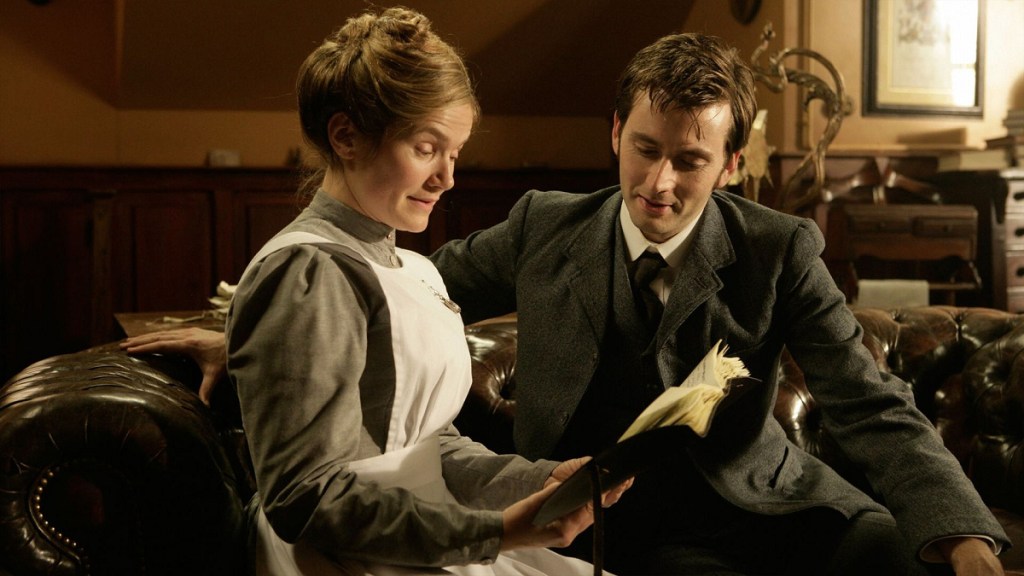
Based on Paul Cornell’s 1995 New Adventure novel (featuring the Seventh Doctor and Bernice Summerfield), this two-parter continues Series 3’s examination of faith and capricious gods while also utilising the BBC’s ever-reliable ability to produce period dramas set in British history. Here we are at a boy’s school in 1913, and the context is slightly changed. In the book, the Doctor became human to try to understand his companion’s grief better, and was unaware that he was being followed. In the episode, the Doctor is specifically trying to get away from the titular family and so his actions bring the antagonists to the school where they hunt him.
While it’s unclear how much the Doctor chooses this setting, he knows he’s becoming human and tells Martha that she’ll have to improvise. So, on top of bringing chaos with him he places Martha into a really difficult situation complicated further by 1913 attitudes to race (which are essentially the same as 2022 attitudes to race but far enough in the past that we can pretend everything’s fine now). It doesn’t occur to the Doctor what he’s about to put people through, and he’s called out for this. It’s one of those moments where the character is far less than heroic, too much for some, but it really works in the context of Series 3.
Again, it’s a really strong production. There’s a lot of nightmarish imagery, great acting, and interesting characters, but I’d point to the scene where the Doctor rewrites his biology as a moment where the acting, editing, music and direction all come together to produce a really intense moment of television using flashbacks and contrast to great effect, and that final gut punch of the Doctor saying ‘Thank you’.
3. The Empty Child/The Doctor Dances (Series 1, Episodes 9 & 10, 2006)
Written by Steven Moffat. Directed by James Hawes.
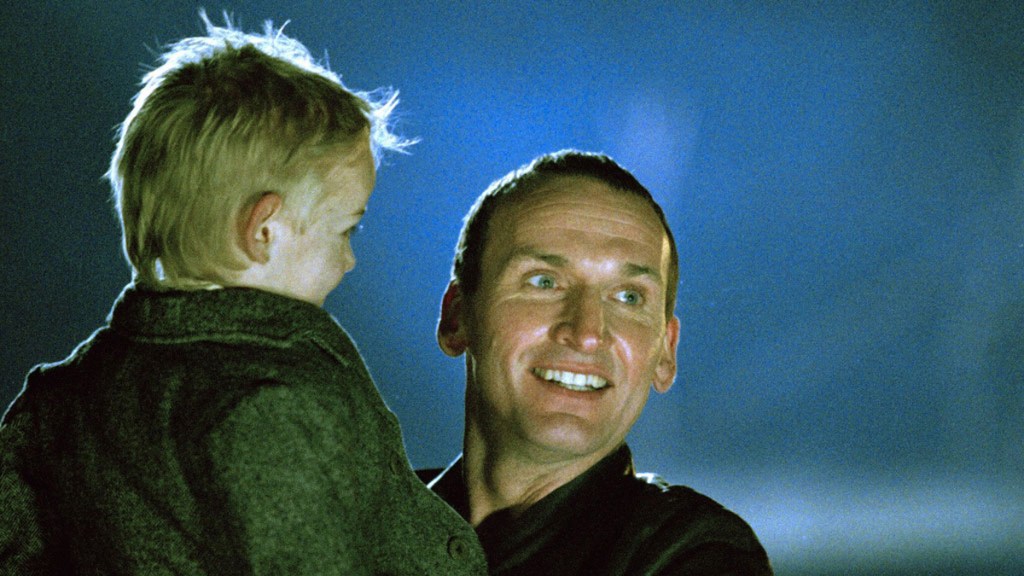
Consider the New Adventures novels of the Nineties: adult-orientated Doctor Who that inevitably got a reputation for provocative content when writers confused ‘adult’ for sex and swearing. However the best of that range expanded what the series was capable of, and these developments were reflected in the difference between Season 26 in 1989 and Series 1 in 2005. It’s not necessarily that they wouldn’t have happened without the New Adventures, so much as a sign that that range was forward-looking. You can’t imagine a story insisting ‘The Doctor F**ks’ prior to 1990, for example.
Considering the pamphlet that could be made from compiling Steven Moffat’s misguided sex-comedy moments in Doctor Who, this is actually restrained and delivered more as an aside than a big Moment (though of course this story has a few of those too). It’s quite matter-of-fact about sex and desire as motivations for behaviour, to the point where it’s not a big deal. Certainly it’s not what the episode was remembered for, which is that it’s scary.
On paper, a boy in a gas mask saying ‘Are you my mummy?’ is not scary. The Doctor celebrating that nobody died is not, on paper, as cathartic as it is on screen. Again the context of the Time War gives the Ninth Doctor a similar sense of pathos as the First had – they’re both clearly missing and longing for some version of home they can’t reach – and also placing this story at the end of the middle third of the series means we’ve seen the Doctor fail, or at best succeed with losses. It’s placed at the right point in the series to have maximum impact. The scripts here are bolstered by another really strong period production that lifts them further. As ever, Eccleston nails the emotional beats and – on top of the scares and gags and commentary on the uncontroversial nature of sex – there’s this colossally cathartic moment of pure joy where the Doctor gets to save everyone. Which brings us to:
2. Silence in the Library/Forest of the Dead (Series 4, Episodes 8 & 9, 2008)
Written by Steven Moffat. Directed by Euros Lyn.
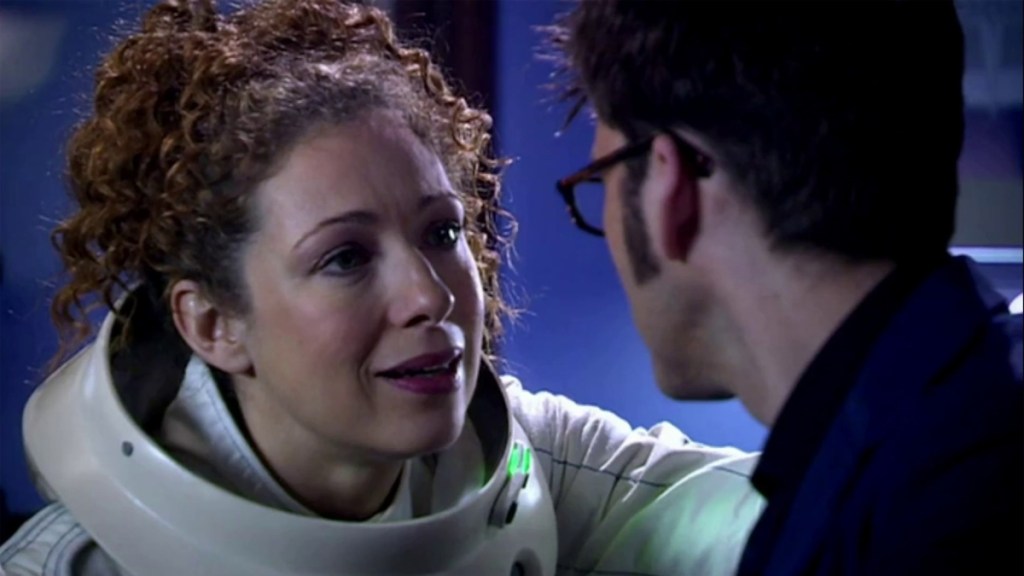
This one almost feels like it doesn’t belong in this era, seeing as it’s setting up River Song’s story and indeed has some moments that are paid off by the rest of her arc, but it’s like a moment in a relay race when a baton is handed over. To some extent, Steven Moffat’s scripts existed in their own little microcosm of Doctor Who already, but on broadcast we knew that he was the next showrunner, so the potential for hubris was there. Fortunately this is incredible, working as a self-contained story while also casually laying foundations for the next three series. Indeed, its origins went as far back as 2005, when Moffat came up with the initial ideas but found himself unable to write the story until 2007 (using some of the concepts from his original idea in his other stories) when he was asked to become the new showrunner.
Due to it being part of a long-term plan, the story has aged well, with River Song’s material being the main beneficiary. However at the time there was a lot to appreciate: The Vashta Nerada are a great idea, and Murray Gold gives them a music cue which sounds like it should soundtrack folk walking into a murder scene in Taggart. Catherine Tate’s sheer terror at the disappearance of her children is a stunning bit of acting, and it’s jam-packed full of ideas. The episode under-running led to scenes like Miss Evangelista’s death where her consciousness fades away, which is bloodless and harrowing. Also, if you accept emails between Moffat and Davies as a basis for canon, it’s got a future incarnation of the Doctor in it (Moffat privately intended Colin Salmon’s Dr. Moon to be the uploaded consciousness of the Doctor, but left it out of the story).
All of which is quite impressive for a story that’s basically just a pun on the word ‘save’.
1. Bad Wolf/The Parting of the Ways (Series 1, Episodes 12 & 13, 2005)
Written by Russell T. Davies. Directed by Joe Ahearne.
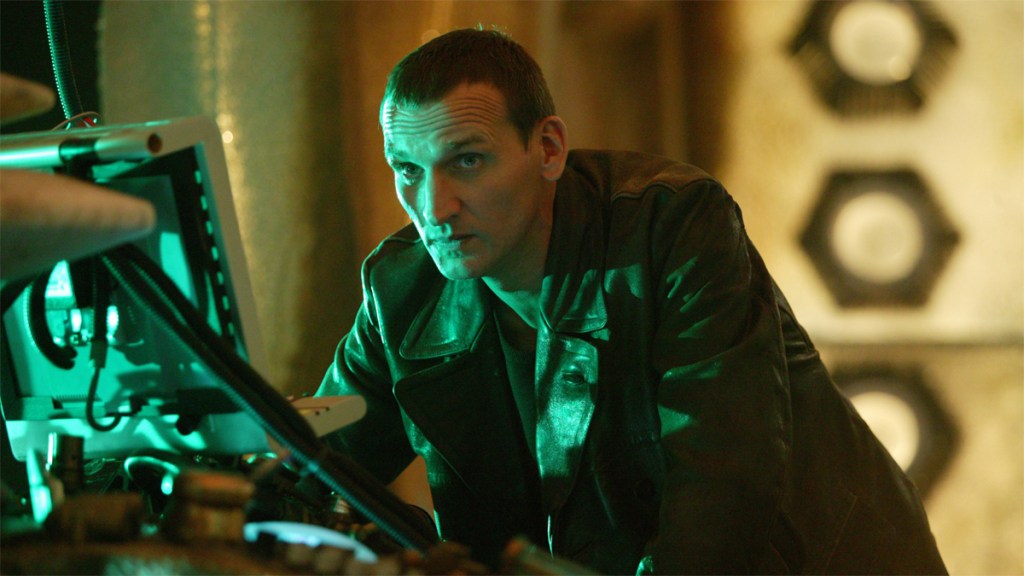
You may have noticed in other ranking articles that Den of Geek are rather fond of this story. Maybe it’s harder to be objective about stories, no matter how old they are, if you sat through them on broadcast; this is especially true when we’re getting the first (or, arguably, one of the first) series finales in the show’s history. Even if you’d argue it’s not the first of its kind, it’s certainly the first of its kind to achieve this kind of scale, and the shock of the new on broadcast was simply exciting.
Praise for this story can often be centred around the Doctor and the Daleks (and, to be fair, the Doctor and the Daleks in this are incredibly well written and performed) but an aspect of it that’s aged surprisingly well are the parodies of then-contemporary television. Firstly it separated Doctor Who from any lingering sense of being a programme of the past, and secondly it works both as a critique of these programmes and something that seems strange enough to have been invented for this story. The original intent may not have been so vicious, indeed, it may have been almost celebratory of popular television shows, but the impression you’re left with watching these versions of The Weakest Link, Big Brother and What Not To Wear is that the viciousness was already there – in these versions it’s just more obvious. Having the presenters of these shows appear oblivious to this satire just adds that little extra layer.
Fundamentally, though, this story functions as an end to the Time War. Ultimately it was not the end, but due to the doubt that Doctor Who would come back for more than one series it had to function as a complete story. In isolation it finishes the Ninth Doctor’s storyline with aplomb, giving the Doctor a genuine dilemma to wrestle with and the reward of having someone else take on the problem.
Taken as part of Davies’ run on the show, it’s interesting to look at ‘The Parting of the Ways’ and Rose’s speech in the café about travelling with the Doctor being a better life, not because of the things she’s seen but because it wasn’t a casual acceptance of the status quo (which is why ‘The Fires of Pompeii’ is such a good Donna story – she challenges the Doctor’s acceptance of fixed points in time). The stories in this list show the rollercoaster ride of Davies’ tenure, the excitement and the terror and crucially the death: Julie Gardner, the Executive Producer for these series, said she thought the show was about death, and how characters respond to it. The series is setting up the Doctor as someone who enters dangerous situations and exacerbates them (‘Dalek’ being a prime example of this), which means people die. What Davies was especially good at doing was making death matter, letting it have an impact.
In ‘Rose’, Clive is killed and realises he’s on the cusp of something huge, but that he’s a small part in it. In ‘Love & Monsters’ and ‘Human Nature’ the Doctor’s mere presence brings destruction onto a small group of innocent people. Rose is having the trip of a lifetime but her mother is left at home to pick up the pieces – and notice how Jackie and Mickey help Rose return to the Doctor in ‘Parting of the Ways’, even though it breaks their hearts. It’s genuinely tough to watch in places.
The Tenth Doctor especially is this ludicrously charismatic figure where he takes you on an adventure and strays too close to the sun. While it makes for memorable television, would it be so bad if Davies moves away from this concept for his new stories? You can already see Moffat breaking away from this idea that the Doctor is ultimately a destructive force, but more on that next time.
